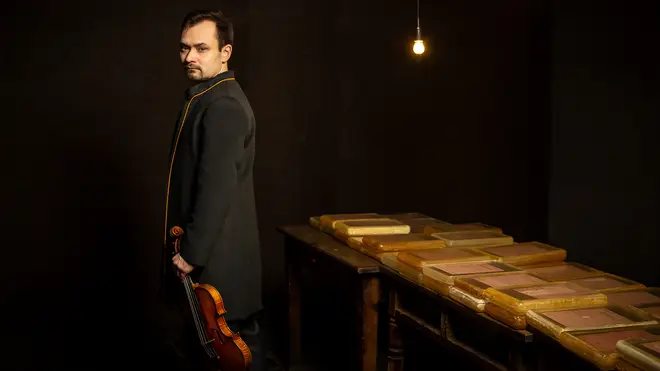On Air Now
Early Breakfast with Lucy Coward 4am - 6:30am
15 March 2021, 11:09 | Updated: 16 March 2021, 18:00

Until after his death, the score for Polish composer Ludomir Różycki’s forgotten violin concerto lay buried in a suitcase in the garden of his deserted Warsaw home.
Amid the countless horrors of the Second World War were policies designed to try to extinguish Poland’s cultural identity, from its thriving music scene to its treasured artworks.
During the Nazi occupation, thousands of Polish artists were killed, several historical artefacts were looted, and many musicians and orchestras were forced to go underground in the face of a cultural genocide.
Ludomir Różycki, a Polish composer, belonged to a group of music-makers who, after the First World War, sought to reinvigorate their country’s music. He found great success with his ballet Pan Twardowski, which became the first Polish large-scale ballet to be performed abroad.
Różycki began work on his Violin Concerto in 1944, the summer of the Warsaw Uprising – an operation to liberate Warsaw from German occupation.
It became clear that Różycki and his family urgently needed to find a safe haven. They fled their home in Warsaw, but not before Różycki had hidden the manuscript in a suitcase and buried it at the bottom of his garden.
Read more: The most moving classical music composed in wartime >

Różycki’s family home didn’t survive the traumatic uprising. After the war, he found work teaching and composing in Katowice, some 300km south-west of the Polish capital, and had resigned himself to the loss of the concerto.
Years later, construction workers clearing the ruins of his house came across the unexpected piece of history. The scores inside found their way to the archives of Poland’s National Library, where they lay forgotten until very recent years.
In 2018, violinist Janusz Wawrowski came across the scores and was mesmerised. “It was some years ago that I first encountered fragments of the manuscript,” says Wawrowski, who is one of Poland’s leading classical violinists.
“This wonderful work spoke to me immediately, and the thought was planted in my head that, like a phoenix rising from the ashes, it should be reborn and enjoyed by audiences around the world.”
With the help of a researcher and much scouring of the archives, Wawrowski managed to piece the work together and track down the missing, opening 87 bars of the orchestrated full score.
Working with pianist and composer Ryszard Bryła, he set about reworking the concerto, editing the solo part to fit comfortably under a violinist’s fingers. The project took several years, and in 2018, Wawrowski eventually premiered the opulent, post-Romantic concerto to a live audience.
“The result, we hope,” says Wawrowski, “Is as close to Różycki’s original thinking as possible…
Read more: 10 incredible photos of composers’ original pianos >

Janusz Wawrowski - PHOENIX - the story of lost-in-war Violin Concerto by Ludomir Różycki
“To me, the concerto is full of the energy and life of Warsaw before the war, and I think the composer was trying to conjure up and convey this positive energy as he wrote it in 1944 – a very dark time, as the artillery of the Nazis rained down on the city,” the violinist adds.
Now, the concerto has been officially released as a recording, in a new album paired with Tchaikovsky’s Violin Concerto. While the latter has long been one of the world’s favourite violin concertos, the Różycki was never performed in the composer’s lifetime, and assumed lost by the composer himself, who died in 1953 before it was rediscovered.
“Looking back at the turbulent history of our civilisation and at times of unrest, we see that culture and art have always played an essential role in humanity,” Wawrowski says. “Artists, in the face of sad realities, have consciously used their creative power to produce works bringing both hope and joy.
“This is the message of the two violin concertos recorded on this album. Both were written at very difficult moments in the lives of their creators – Tchaikovsky was seeking refuge in composition after the painful breakdown of his marriage.”
Wawrowski adds: “It is incredible that Różycki’s concerto was written in the darkest times and carries such positive energy. In spite of the daily reality engulfing the composer, his spirit of hope for a better future was well and truly still alive.”
‘Phoenix’ by Janusz Wawrowski is Classic FM’s Album of the Week. Hear it every weekday from Monday 15 March just after 10.15am. Listen to Alexander Armstrong’s show live every weekday, or catch up afterwards on Global Player.